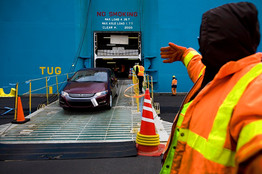RICHMOND—Investments made to boost Richmond's ailing port into a major gateway for car shipments appear to be paying off as manufacturers begin to move in.
View Full Image

Brian L. Frank for The Wall Street Journal
The Port of Richmond has recast itself as a gateway for automobile shipments. A port worker guided Hondas as they were unloaded at the port this week.
In January, Richmond announced that car maker Subaru of America Inc. had agreed to a five-year contract to import and process more than 30,000 cars a year through the port. The deal followed the September launch of Honda Motor Co.'s 15-year agreement with the city, which will see it import about 150,000 vehicles through Richmond annually.
The combined contracts will net Richmond more than $90 million in tariff fees that it will levy on the car shipments over the duration of the agreements. The contracts also will result in about 200 new jobs in direct and ancillary positions, said James Matzorkis, executive director of the Port of Richmond.
In addition, the East Bay city is negotiating with Toyota Motor Corp. and Chinese auto maker BYD Co. to ship cars through the port. A Toyota spokeswoman said the company was actively looking at all Bay Area ports and a decision has yet to be made about Richmond. BYD didn't return calls seeking comment.
The new contracts arrive after a tough stretch for Richmond in the 1990s and earlier this decade, as the port faced an expensive environmental cleanup and lost business to cities with more up-to-date shipping facilities.
"We've taken some hits in the past, but we're definitely making gains now," said Mr. Matzorkis.
Richmond leaders also say the improved port will provide an economic shot in the arm to ailing city coffers. Richmond, population 102,000, had to cut some city services for the year ending June 30 to offset a drop in tax revenue. The city's unemployment rate is 17.5%, nearly double the national average.
"We're like many other cities out there who are struggling," said Tom Butt, a Richmond city council member. "So to see such a return on our investment is huge."
The port faces stiff competition from larger rivals along the West Coast. But a shift within the shipping industry toward cargo-container traffic pushed car makers to seek relationships with midsize and small ports, buoying ports like Richmond.
Unlike most ports in the Bay Area, the Port of Richmond is nearly 70% privately owned. Oil companies including BP PLC and ConocoPhillips Co. as well as international energy-storage companies like Kinder Morgan Inc., own and run private operations there. The result is that the publicly owned portion of the port is smaller than that of other ports in the region.
Richmond's port also is managed by the city's elected officials instead of a stand-alone agency or public authority, an arrangement that can pull port operations into political battles.
Despite the signs of progress, some experts question the decision to turn to auto operations to improve the port's prospects.
Jock O'Connell, an analyst with Beacon Economics, a Los Angeles-based research firm, said receiving car shipments requires a port to dedicate extensive space to the thousands of shipped vehicles that sit awaiting dealer orders. Mr. O'Connell said because land values in the Bay Area were high, the city might have fared better if it decided earlier this decade to develop the land for commercial real estate or even residential use to take advantage of its premium location and views.
Mr. O'Connell also pointed out that Richmond's port faces stiff competition from the Port of Benicia about 15 miles northeast of Richmond, which can accommodate more ships loaded with cars.
"I'm unsure if valuable waterfront property should be used for what is essentially a large parking lot," he said.
In response, Mr. Matzorkis said the city is restricted by state and federal law on how it can develop the port property and must adhere to strict land-use designations, which prohibit commercial and residential development.
But Will Travis, executive director of the San Francisco Bay Conservation and Development Commission, which regulates development on the bay, says Richmond does have some leeway in negotiating changes to regulations to allow commercial and residential development. Mr. Travis says a local government can petition to have restrictions on a designated location changed or reduced in size. Richmond hasn't made a request to his agency, he says.
"If you accept the premise that the bay should remain a maritime center and land needs to be reserved for that, then Richmond's strategy makes sense," says Mr. Travis. "But that's not to say they're absolutely restricted from doing something else."
Mr. Matzorkis responds that while it is possible that Richmond could petition to develop some port land, the city will stick with its plan drafted earlier this decade, which calls for increasing cargo traffic at the facility.
Since 2003, the city has invested more than $50 million in rail lines and docking equipment at the port to attract car manufacturers, selling bonds to raise the funds. The plans were slow to bear fruit, said Mr. Matzorkis, because of required environmental studies and delays in construction. But now, with most of the upgrades complete, the city wants to court new tenants, he said.
Christopher Martin, a spokesman for Honda's U.S. unit, said the company has shipped most of its cars through the Port of San Diego for the Northern California market and some southern states. But it has chosen Richmond to move the bulk of this traffic because of the port's upgraded rail lines. Shipping through Richmond also lowered Honda's fuel costs for shipments to dealerships in the Bay Area.
The upgrades also played a big role in attracting Subaru, which is owned by Japan's Fuji Heavy Industries Ltd.
"We needed a better facility to help us expand logistics on the West Coast and Richmond's port was best for us," said Michael McHale, a Subaru spokesman.
Write to Bobby White at bobby.white@wsj.com

